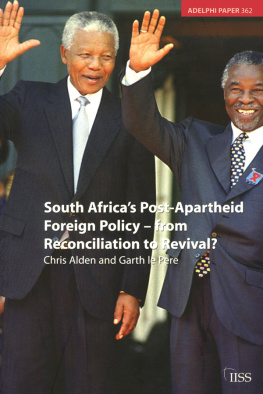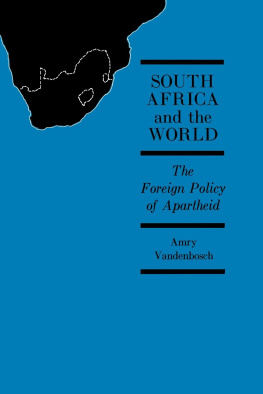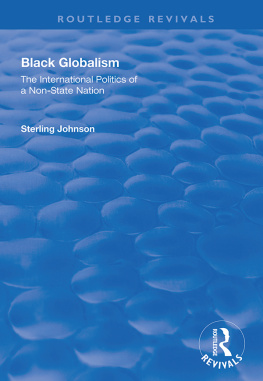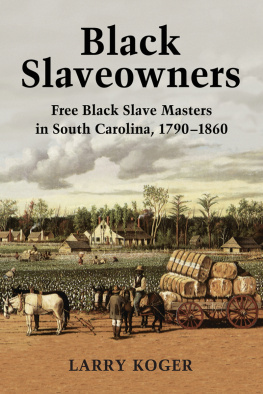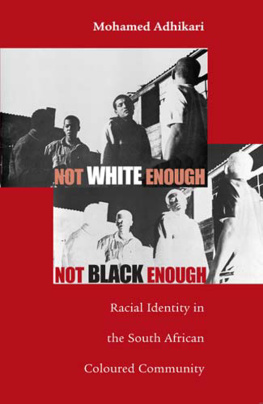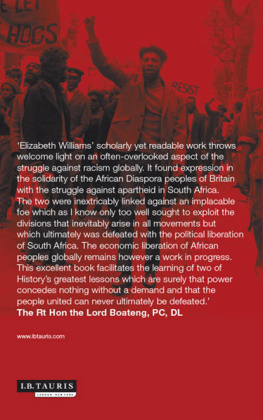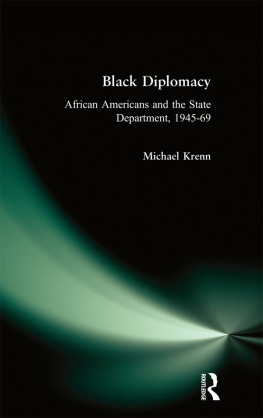Winning Our Freedoms Together
Justice, Power, and Politics
Heather Ann Thompson and Rhonda Y. Williams, coeditors
EDITORIAL ADVISORY BOARD
Peniel E. Joseph
Matthew D. Lassiter
Daryl Maeda
Barbara Ransby
Vicki L. Ruiz
Marc Stein
The Justice, Power, and Politics series publishes new works in history that explore the myriad struggles for justice, battles for power, and shifts in politics that have shaped the United States over time. Through the lenses of justice, power, and politics, the series seeks to broaden scholarly debates about Americas past as well as to inform public discussions about its future.
More information on the series, including a complete list of books published, is available at http://justicepowerandpolitics.com/.
Winning Our Freedoms Together
African Americans and Apartheid, 19451960
NICHOLAS GRANT
The University of North Carolina Press Chapel Hill
2017 The University of North Carolina Press
All rights reserved
Set in Charis and Lato by Westchester Publishing Services
Manufactured in the United States of America
The University of North Carolina Press has been a member of the Green Press Initiative since 2003.
Library of Congress Cataloging-in-Publication Data
Names: Grant, Nicholas, author.
Title: Winning our freedoms together : African Americans and apartheid, 19451960 / Nicholas Grant.
Other titles: Justice, power, and politics.
Description: Chapel Hill : University of North Carolina Press, [2017] | Series: Justice, power, and politics | Includes bibliographical references and index.
Identifiers: LCCN 2017015853| ISBN 9781469635279 (cloth : alk. paper) | ISBN 9781469635286 (pbk : alk. paper) | ISBN 9781469635293 (ebook)
Subjects: LCSH : African AmericansPolitical activityHistory20th century. | Anti-apartheid movementsUnited StatesHistory20th century. | Anti-apartheid movementsSouth AfricaHistory20th century. | United StatesForeign relations20th century. | South AfricaForeign relations20th century. | Cold WarInfluence.
Classification: LCC E 185.61 . G 74 2017 | DDC 323.1196/0730904dc23
LC record available at https://lccn.loc.gov/2017015853
Cover illustration: Detail from Council on African Affairs, A Call from the heroic peoples of Africa to Negro and white Americans, 1954. W. E. B. Du Bois Papers (MS 312), Special Collections and University Archives, University of Massachusetts Amherst Libraries.
Portions of chapter 3 were previously published as Crossing the Black Atlantic: The Global Anti-Apartheid Movement and the Racial Politics of the Cold War, Radical History Review 119 (2014): 7293. Republished with the permission of Duke University Press.
Portions of chapter 8 were previously published as The National Council of Negro Women and South Africa: Black Internationalism, Motherhood, and the Cold War, Palimpsest: A Journal of Women, Gender, and the Black International 5, no. 1 (2016): 5987. Used here with permission.
For my parents
Contents
Travel and Anti-Apartheid Activism
Heroic Masculinity and Anti-Apartheid Politics
Illustrations
,
,
,
,
,
,
,
,
,
,
,
Acknowledgments
This book has taken me from the United Kingdom to the United States to South Africa and back again. On each of these journeys, and over eight years of researching and writing, I have had the privilege of meeting many incredible people and have racked up countless debts.
I have learned from a number of exceptional scholars who have been incredibly generous in giving up their time to read and engage critically with the entire manuscript as it has developed over the years. I owe a special debt of gratitude to Kate Dossett. Kate first challenged me to think about African American history from a transnational perspective when I was an undergraduate student at the University of Leeds. Since then, she has been a constant source of intellectual inspiration, pushing me to think more critically about the past, as well of the responsibility of the historian to uncover and accurately represent marginalized voices. Kates incisive feedback on numerous draft chapters has greatly strengthened this project and I cant thank her enough for her unwavering support as well as her friendship. Shane Doyles knowledge of African history and analytical eye was invaluable as I wrestled with the historiography of the anti-apartheid movement, while his calmness under pressure helped me to believe that it was possible to actually get this finished. I am also incredibly grateful to Alex Lichtenstein for the time he has taken to critically engage with this work. Alex has significantly enhanced my understanding of the global anti-apartheid movement and his insightful feedback on how best to revise the book has been invaluable. He has also offered a great deal of support and mentorship over the last five years. Simon Hall should be praised for pushing me to think more about the broader significance of this research. Specifically, his insistence on historical rigor has challenged me to think more deeply about my arguments as well as the possibilities and pitfalls of transnational history.
I am lucky to have had the support and encouragement of a number of colleagues and friends, all of whom have generously given up their time to read and discuss my research. Bill Booth, Antonia Brown, Vincent Hiribarren, Matthias Freidank, Say Burgin, Gina Denton, John Munro, Tom Davies, Julio Decker, Althea Legal Miller, Elisabeth Engel, Bevan Sewell, Kaeten Mistry, Brandy T. Wells, Emma Long, Becky Fraser, and Jackie Fear Segal have all read sections of this manuscript. A shout out too to Michelle Coghlan and Nick Witham for their collegiality and for answering so many questions about the publishing process. Thank you too to Hazel Goodwin, whose remarkable life story taught me so much about 1950s South Africa. Collectively, these individuals have shared their knowledge, recommended resources, pushed me to make bold arguments, and helped me avoid a number of scholarly pitfalls. Brandon Proia at the University of North Carolina Press has been patient and understanding. He has made this process much less stressful than it might have been and I am grateful for all of his work in pushing the manuscript forward. Id also like to thank Jad Adkins at UNC Press for all of his work on the manuscript. Finally, I owe a special debt of gratitude to Heather Ann Thompson, who supported this project in its early stages. While the input of all of these individuals has been invaluable, any errors that remain within this manuscript are, of course, my own.
Librarians and archivists are often the unsung heroes of historical research. I would have been completely lost without the knowledge, insight, and frequent tip-offs from staff at the Manuscripts Division at the Library of Congress, the Schomburg Center for Research in Black Culture at the New York Public Library, the National Archives for Black Womens History (especially Kenneth Chandler), the Moorland-Spingarn Research Center at Howard University, Manuscripts & Archives at the University of Cape Town, the National Library of South Africa in Cape Town, the National Archives in Pretoria, and the Historical Papers research archive in the William Cullen Library at the University of Witwatersrand (especially Gabriele Mohale). I would also like to thank Bob Edgar for agreeing to meet with me in Cape Town to discuss my research planshis encyclopedic knowledge of South African archives helped me locate materials that I otherwise would have missed. The multi-archival and international nature of this research was only made possible by financial support from the Arts and Humanities Research Council in the United Kingdom. The John F. Kennedy Institute for North American Studies at the Freie Universitt Berlin provided me with valuable thinking space and time as a postdoctoral fellow in 2012.


